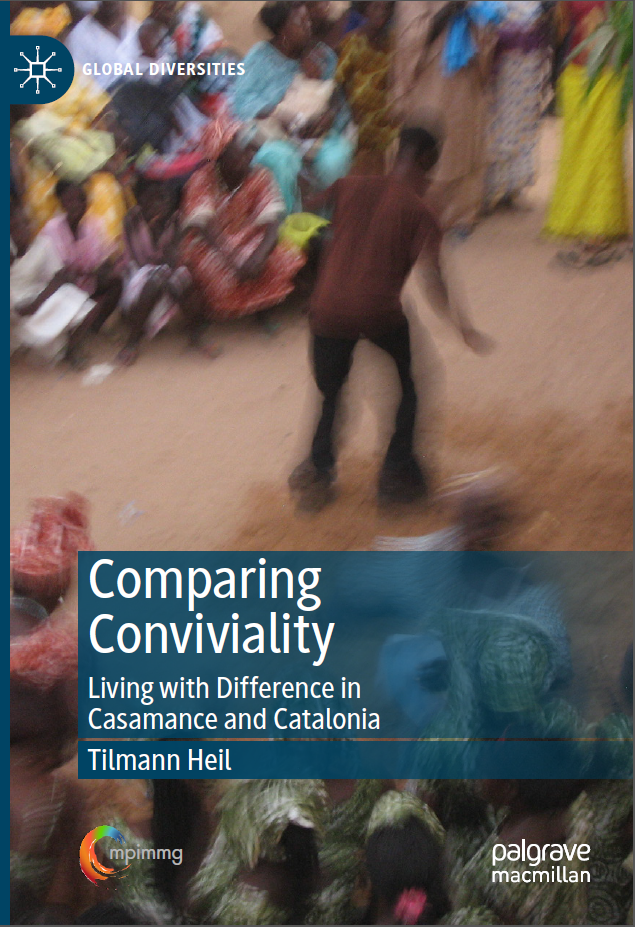|
As a key part of my research for the book Comparing Conviviality, I reflect on the differences between me and my interlocutors, my privilege and the commonalities we identified and challenges we faced. The relations we forged throughout the research process and beyond materialized at the intersection of race, origin, class, world view and outlook, among others.
Impressions from the presentation and debate of Comparing Conviviality at the Núcleo Interdisciplinar de Estudos Migratórios (NIEM), IPPUR, Universidade Federal do Rio de Janeiro, in March 2020.
The sound at the beginning and end are from ZigFest in 2010 in Ziguinchor, Senegal which I discuss in Chapter 4: Staged and sensous. If ever you do not have access to the book through your institution, please get in touch.
The book Comparing Conviviality takes the claim to a better knowledge and practice of how to live with difference foreward that Senegalese migrants in Catalonia made. Pursuing such non-hegemonic knowledge during 18-month of multi-sited, ethnographic fieldwork in Casamance, Senegal, and Catalonia, Spain, this quest has led to the formulation of an unstable concept: conviviality.
Impressions from the presentation and debate of Comparing Conviviality at the Núcleo Interdisciplinar de Estudos Migratórios (NIEM), IPPUR, Universidade Federal do Rio de Janeiro, in March 2020.
The sound at the beginning and end are from ZigFest in 2010 in Ziguinchor, Senegal which I discuss in Chapter 4: Staged and sensous. If ever you do not have access to the book through your institution, please get in touch.
My work on migration accross one of the most unequal geographies in the world, the Mediterranean, was driven by the dissatisfaction with how the people were mainly framed: victims, criminals, or undeserving 'bogus' refugees. These debates are often driven by the problem of Europeans to deal with those who are different at their doorstep. My book Comparing Conviviality shifts this debate, engaging with the knowledge of mobile Africans and how they live with difference.
Impressions from the presentation and debate of Comparing Conviviality at the Núcleo Interdisciplinar de Estudos Migratórios (NIEM), IPPUR, Universidade Federal do Rio de Janeiro, in March 2020.
The sound at the beginning and end are from ZigFest in 2010 in Ziguinchor, Senegal which I discuss in Chapter 4: Staged and sensous. If ever you do not have access to the book through your institution, please get in touch.
Núcleo Interdisciplinar de Estudos Migratórios, IPPUR, Universidade Federal do Rio de Janeiro
During the second discussion of my monograph Comparing Conviviality during the first meeting of the Interdisciplinary Group on Migration Studies at the Federal University of Rio de Janeiro, I conveyed a long story in a nutshell: how my thinking on conviviality is grounded in representations and practices of neigbhourliness and cohabitation that make it necessary and possible to arrive at a concept of living with difference that frames forms of minimal sociality in unstable, uncertain, and changing urban contexts. This contrasts to Stuart Hall's characterisation of most of our concepts, which social sciences came up with to give us the impression of a stability that in actual fact never existed. Conviviality instead is meant to be a simple tool to speak of such complex and challenging situations and describe how human sociality unfolds in them.
I thank my colleagues from the Research Group and other participants for their interest and appreciation, especially Prof. Miriam da Silveira Santos who kicked off her comments with: 'I have accompanied Tilmann's work for some years now; no I finally understood what he does. He goes back to a key dimension of anthropology: that of comparison.' It resonated with Prof. Joana Bahia observation how I pay attention the fact that our interlocutors in the field - in my case transnational Senegalese from the Casamance region - are the true masters of comparison.
Três debates do meu livro em lançamento
I: Museu Nacional, Horto Botânico, Quinta da Boa Vista, s/n - São Cristóvão, Rio de Janeiro 12 de março 2020, 9:30 horas com os debatedores Joana Bahia, Professora titular, Universidade do Estado do Rio de Janeiro El Hadji Diallo, Jornalista e tradutor independente Charles P. Gomes, Pesquisador, Fundação Casa de Rui Barbosa II: Núcleo interdisciplinar de Estudos Migratórios, IPPUR, UFRJ, Rua da Lapa 120 / 204 13 de março 2020, 17:00 horas com a debatedora Miriam de Oliveira Santos, Universidade Federal Rural do Rio de Janeiro III. Centro de Estudos Africanos, Universidade de São Paulo, USP Sala 08, Avenida Luciano Gualberto 315 16 de março 2020, 15:00 horas com os debatedores Alexander Yao Cobbinah, USP Luciane Scarato, Universidade de Colônia e Mecila/Cebrap Sumário do livro Em um mundo onde a diferença é muitas vezes vista como uma ameaça ou desafio, o livro explora como as pessoas realmente vivem em sociedades diversas. Baseado numa etnografia a longo prazo de africanos ocidentais, tanto no Senegal como na Espanha, este livro propõe que a convivialidade é um compromisso com a diferença entre etnias, línguas, religiões e práticas. Tilmann Heil reúne histórias de longa data, projetos políticos e práticas cotidianas de viver com a diferença. Com foco na vida de bairros em Casamança, Senegal e Catalunha, Espanha - duas regiões igualmente complexas - o livro mostra como os senegaleses negociam e traduzem com habilidade os meandros da diferença e do poder. Nestes mundos africanos e europeus vividos, a convivialidade é sempre temporária e em transformação. Este livro oferece uma leitura texturizada, realista, porém esperançosa, da diferença, da mudança social, do poder e do respeito.
|

 RSS Feed
RSS Feed